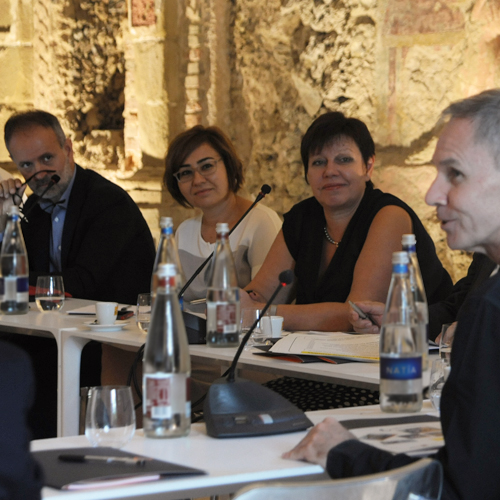
EMBA Consortium 2016 in BBS
12 September 2016The Deans, Associate Deans and Program Directors of the 10 participating schools in the EMBA Consortium for the Global Business Innovation met at Villa Guastavillani to dialogue about the future of the Consortium and its activities.
We sat down with José de la Torre, DBA, EMBA Consortium Executive Director, and talked about the future plans to take this academic network to the next level.
The EMBA Consortium was created to insert a strong international experiential element into existing Executive MBA programs at the four founding institutions. Having proven the value of this new approach, the group sought to expand by inviting other globally-minded business schools around the world to join in. As they did so, each new participating school provided additional diversity in terms of geographical locations and industry focus they could offer to their students, in addition to a life-long offer of opportunities to their EMBA Alumni.
How do you define Global Business Innovation?
Our focus is to understand what successful companies in other economic and political environments do differently from what you might be used to at home. What different business models they utilize and how they add value to their customers. To comprehend how they deal with societal pressures with questions such as sustainability and diversity. This is the main purpose of the EMBA Consortium, to take students out of their comfort zone, put them in a different environment and expose them to innovative ways of dealing with business issues. And that is what we mean by Global Business Innovation.
The differentiating factor.
The big difference is that when you enroll in one of the schools that is part of the EMBA Consortium, you have the chance to be taken out of your “cocoon”. For example, when you arrive in, say, South Africa, as part of your International Week experience you will be part of a group where there are at least six, and often more than 12, different nationalities around you, all facing a context that is not their own. You get to experiment other cultures in a unique way, and compare experiences with peers from a multitude of environments.
Executive MBA Alumni are eligible to continue to attend these international programs even years after they graduated. So while, for example, when you were attending the EMBA program you went to China, the year after you graduated you might want to go to Brazil, to Russia or to South Africa. And you can continue to do that for as long as you want to, subject of course to availability since current students naturally have priority. That shows that there is value to people who want to keep learning, and we would like to increase that. “We would like to make the program more attractive to the students and better known to the Alumni.”
The results.
“We have achieved most of the objectives we set out to achieve 5 years ago. So in general terms I am very satisfied with the outcomes, and the evaluation results are very good, very positive.”— explains de la Torre with a smile when asked about the satisfying aspects of this project. We now have 10 schools within the network, when we started with only four. By this year, we will count with 918 alumni from the program, both current students and previous graduates. We believe we are adding enormous value to our customers, in the sense that they get to choose to go to nine different countries other than their own to grow their understanding of international business and advance in their professional careers.
The Deans Meeting. Where to go next?
To a large extent, we have been taking our product idea to new markets. Started with the United States, Italy, Brazil and Russia, and adding six other countries throughout the past five years. We have been successful in this, we have been diversifying geographically. Now the question was: should we also diversify in terms of customers and products? For now, it seems that the best option is to stick to what we do while looking to enrich our proposition, that is, adding more value to our current “product” and to our customers. This means adding new services to our existing customers and new channels through which we can offer them. As far as the latest Programs’ Evaluation goes, the numbers are really encouraging. In a scale of one to five, in which four is “very good” and five means “outstanding,” the programs’ overall evaluations have increased from 3.92 points to 4.30 since we started the Consortium. The goal for next year is to achieve an average of 4.4 points. It seems like a small step, but it is a very difficult one because you are dealing with people who are very critical and experienced. You need to cater to them.
